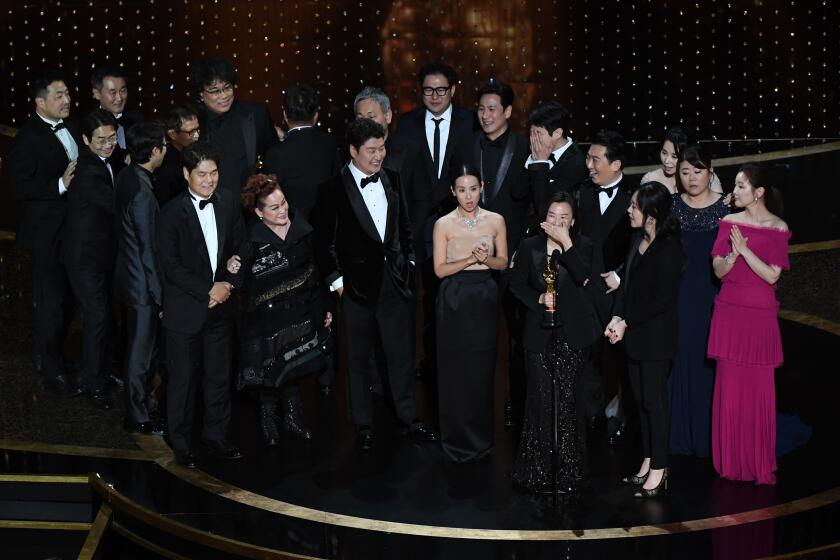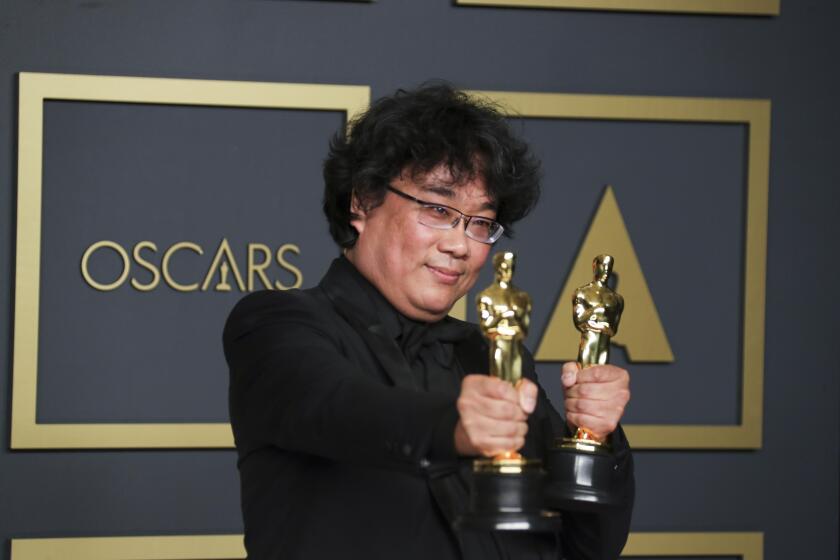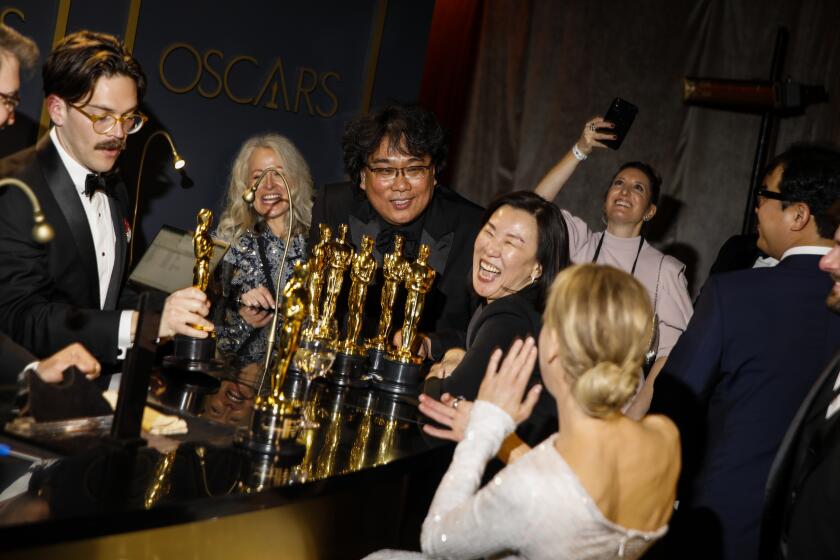‘Parasite’ Oscars are a huge win for Neon. Why the scrappy indie bet on Bong Joon Ho
- Share via
The historic four Oscar wins for Bong Joon Ho’s “Parasite” — including best picture — were groundbreaking for South Korea’s movie business, international film and the awards themselves.
A darkly funny satirical thriller about a poor family that infiltrates a rich household, “Parasite” on Sunday became the first foreign-language feature to win the Academy of Motion Picture Arts and Sciences’ top honor.
Its surprise triumph also marks a major milestone for Neon, the New York indie upstart responsible for its highly successful U.S. theatrical run and awards push.
Run by specialty film veteran Tom Quinn, Neon was a David among Goliaths in the best picture race. The 28-person company, founded 2 ½ years ago, beat well-funded giants, including Sony Pictures’ “Once Upon a Time ... in Hollywood,” Universal Pictures’ “1917” and Netflix’s “The Irishman.”
With “Parasite,” the academy gave best picture to the actual best picture. It also made history.
“Cinema is alive and well, and it triumphed against all odds last night,” Quinn, Neon’s 49-year-old chief executive, told The Times on Monday. “For all the hard work, the belief in the impossible and the belief in true auteur cinema from every corner of the world, it was a win for all of us, and it was a win in the most meaningful possible way.”
“Parasite” is also a financial winner, grossing more than $35 million at the domestic box office since its release in three theaters in October, a hefty sum for a foreign-language film that cost about $11 million to produce. Neon will capitalize on its success by expanding the movie’s footprint to as many as 2,000 theaters this weekend, up from 1,000 cinemas before the Oscars. “Parasite,” however, is already available on home video.
The movie, which also won for director, original screenplay and international feature, is the latest success for Neon, which Quinn launched in 2017 with Tim League, head of the hip cinema chain Alamo Drafthouse, based in Austin, Texas.
Neon has released such offbeat films as “I, Tonya,” “Colossal” and “Three Identical Strangers.” Its 2019 documentary, “Apollo 11,” grossed an impressive $16 million globally. “Honeyland,” a North Macedonian doc, was nominated for two Oscars (documentary and international feature). Neon’s main backer is film financier 30West, which purchased a majority stake in January 2018.
‘Parasite,’ Bong Joon Ho’s genre-bending Korean thriller, made Oscar history in becoming the first foreign-language film to win the academy’s top honor.
The stunning upset for “Parasite” appears to validate Quinn’s strategy for Neon. The distributor bets on edgy films that appeal to the under-25 crowd as well as to the older audiences that typically turn out for critically acclaimed art-house fare.
At a time when indie cinema is struggling to compete with studio blockbusters, Neon employs a tried-and-true strategy by putting films in a handful of theaters before expanding them to additional markets as word of mouth builds. “Parasite,” for example, built its presence gradually, peaking at 620 theaters in November before awards season picked up, broadening its appeal.
“‘Parasite’ is reaching an audience that has never seen a foreign-language film,” Quinn said. “Parents are seeing it because their children are saying, ‘You’ve got to go see ‘Parasite.’”
“Parasite” is the most recent of many films Quinn and Bong have released together. As an executive at Magnolia Pictures, Quinn discovered Bong’s monster movie “The Host,” and released his follow-up, “Mother.”
Photos from inside the 2020 Oscars Governors Ball
Quinn later joined Weinstein Co. to co-found its Radius-TWC specialty label, where he spared Bong’s futuristic action movie “Snowpiercer” from heavy-handed studio edits. Weinstein Co., which Quinn left in 2015, later collapsed after Harvey Weinstein was accused of sexual abuse by dozens of women. Weinstein, now on trial for rape in New York, denied all allegations of non-consensual sex.
Neon first received the script for “Parasite” at the 2018 Toronto International Film Festival. Quinn, struck by its originality and the timeliness of its class-struggle themes, closed the deal that October for the U.S. rights during American Film Market. Quinn waited until the Cannes Film Festival premiere to witness the finished product, produced by Korean-based CJ Entertainment (part of the same conglomerate that brought 4-D cinema to L.A. ) and production house Barunson E&A. It received an eight-minute standing ovation and won the coveted Palme d’Or.
“The thing that immediately struck me was that it was his grandest achievement,” Quinn said.
Neon won’t be able to rest on its laurels. Small companies including Open Road (“Spotlight”) have previously achieved Oscar glory, only to fade away. But producer Joe Pichirallo, who teaches film at New York University’s Tisch School of the Arts, said Neon’s limited release strategy should help it avoid that fate.

“Where you get killed is if you go wide [with a film] right away,” he said. “Then you have to spend millions of dollars on marketing to support it.”
Not that the company doesn’t take risks. At this year’s Sundance Film Festival, Neon and Hulu made a record-breaking deal to acquire “Palm Springs,” a “Groundhog Day”-inspired romantic comedy starring Andy Samberg, for more than $17.5 million. “Groundhog Day,” the Bill Murray classic, is one of Quinn’s top five favorites.
Neon last weekend released horror film “The Lodge” in six theaters, where it collected $76,000. Its next release is the French drama “Portrait of a Lady on Fire,” which opens in 16 theaters this weekend, timed for Valentine’s Day. Neon gave director Céline Sciamma’s film an Oscar qualifying run in December, but was dealt a setback when France decided to submit Ladj Ly’s “Les Misérables” as its official selection for the international feature category.
Nonetheless, Sciamma was there to celebrate with Bong, Quinn and the Neon crew at the company’s after-party at West Hollywood’s Soho House. Later at a Korean barbecue restaurant, Quinn said, Bong stood up and gave a speech in which he praised Sciamma for the success of her film in South Korea. It has collected $894,000 there, according to Box Office Mojo, more than any country other than France.
“This guy just won four Oscars, and he’s celebrating the success of Céline and ‘Portrait of a Lady on Fire,’” Quinn marveled. “Cinema won, and we’re all richer for it.”
Times staff writer Jen Yamato contributed to this story.
More to Read
Inside the business of entertainment
The Wide Shot brings you news, analysis and insights on everything from streaming wars to production — and what it all means for the future.
You may occasionally receive promotional content from the Los Angeles Times.














